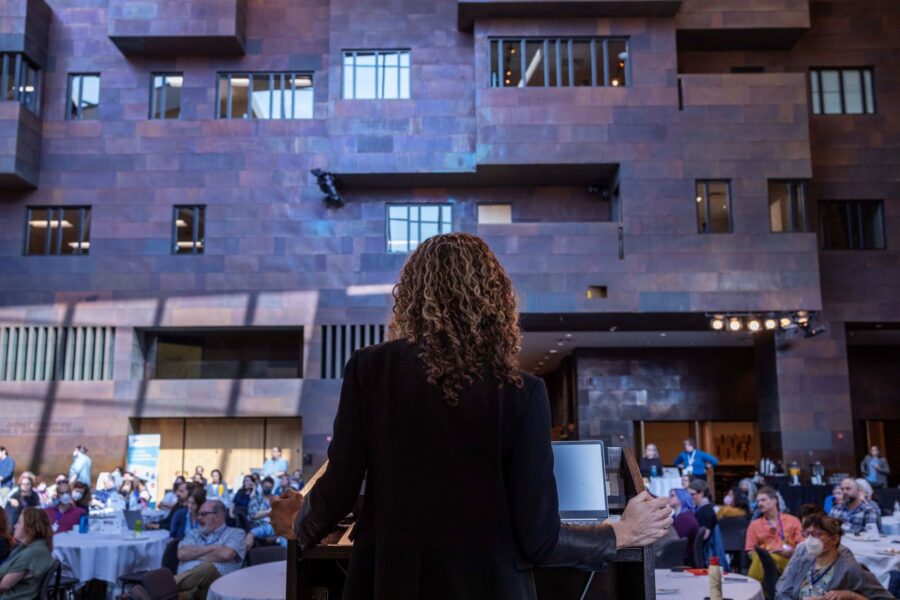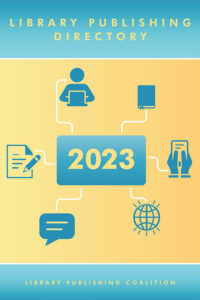January 16, 2024
By Amanda Hurford
Consortial publishing profiles is an occasional series highlighting library publishing programs that offer centralized publishing services to multiple institutions within a geographic region or a consortium
By Amanda Hurford, PALNI Scholarly Communications Director
Getting Started
The Private Academic Library Network of Indiana (PALNI) is an organization owned by 24 small private colleges, universities, and seminaries working under the tagline “Collaborative, Strategic, Innovative.” In 2015, the idea behind one manifestation of those values took root: the PALNI Press library publishing program. PALNI’s Institutional Repository Advisory Group, a team of librarians investigating shared repository services, proposed establishing and piloting shared instances of popular open-source publishing platforms. When PALNI added a full-time position dedicated to supporting scholarly communication initiatives to its staff in 2017, it was the right time to formally support the creation of journals, exhibits, textbooks, and more. As PALNI’s first Scholarly Communications Director, I soon convened a Library Publishing Task Force to explore creating a more robust publishing service by addressing structure, benefits, needs, and plans for the future. In this findings report, the Task Force recommended the establishment of an ongoing team to support the PALNI Press service. The Publishing Services Administration Team was formed to design library publishing policies, provide services, and engage with the Library Publishing Coalition.
Focus and Scope
The PALNI Press and its related teams support publishing open-access content in various formats: repository materials like ETDs and gray literature, exhibits, journals, and books. The service is open to faculty, staff, and students affiliated with any of PALNI’s institutions who want to publish to support their institution’s teaching and learning objectives. We provide “basic level services,” including initial consultation and project setup, introductory education on publishing-related topics, platform hosting and maintenance, data backup, and documentation to use the systems. Additionally, we provide limited support for each publishing platform, including troubleshooting, training, and help with workflow design. Finally, we offer some discovery services by creating MARC records and assigning ISBNS and DOIs, and we also provide print-on-demand services through Amazon Kindle Direct Publishing. A subset of our work is the PALSave Textbook Creation Grant initiative, in which we collaborate with faculty authors to publish open textbooks. We provide author stipends for those projects and coordinate peer review and copyediting for a polished final product.
Technical Setup
PALNI Press is built on a suite of publishing platforms: Samvera Hyku for repository content, Omeka S for exhibits, Open Journal Systems for journals, and Pressbooks for books. Except for the Hyku repository, hosted by Software Services by Scientist.com, PALNI self-hosts all its platforms. The PALNI Development Team handles installation, maintenance, and troubleshooting.
Staffing and Finances
Staffing for the program consists primarily of my role as Scholarly Communications Director, which also is responsible for leadership in other scholarly communications initiatives, and a distributed team of librarians providing support across the consortium. We rely on PALNI’s part-time Development Team for technical expertise, as well as input and help provided by members of the PALNI community with expertise in this area. PALNI’s Strategic Communications Director includes marketing services like writing press releases and web design for our catalog. PALNI’s Cataloging Coordinator catalogs publications when they are completed. A quarter-time Publishing Services Coordinator and a team of volunteer project managers at PALNI schools support the Textbook Creation Grant initiative. PALNI Press is funded by the consortium’s central budget, with additional dedicated money coming from our PALSave Affordable Learning Program grant from Lilly Endowment Inc. to fund the Textbook Creation Grants, its related staffing, and production costs. Supported institutions can use all the platforms as part of their participation in PALNI — no additional fees are charged above annual PALNI dues.
Governance and Decision Making
The Publishing Services Administration Team created a set of policies to help with governance and decision-making. The group set the mission for the service, eligibility, responsibilities for both contributors and the Press, and guidelines for copyright, privacy, diversity, and accessibility. I consult with the publishing team and PALNI’s Board of Directors on program direction. Each new publication does not require approval but must meet the eligibility requirements and responsibilities listed on the website. Typically, a contributor will propose a publication, and team members will meet with them to discuss expectations before getting started. A separate OER Publishing Task Force set up all the program documentation for the Textbook Creation Grants (such as the call for proposals, application, selection rubric, etc. — all available CC-BY on the project website), and the two programs’ policies complement each other.
Lessons Learned
We learned that exploring the need for consortial publishing services is beneficial. Our task force surveyed library directors about their interest in and barriers to library publishing, which helped to define future directions. Our team also found that it’s been helpful to have policies documented to guide decision-making, and defining and documenting responsibilities is essential. The approach to categorize services into manageable groups made the idea of developing a comprehensive support model seem less daunting. Also, leveraging the talents of all consortial staff and participating librarians is essential to building a service that is not too demanding for any one person. One pitfall to avoid in projects with deadlines is to check in early and often with authors and to ask them to create a writing schedule.
PALNI is delighted to work with librarians, faculty, and others on this exciting path to library publishing!
To reach PALNI Press, email press@palni.edu.
Featured item: Comunidades




 As much as we love the searchable online interface for the
As much as we love the searchable online interface for the